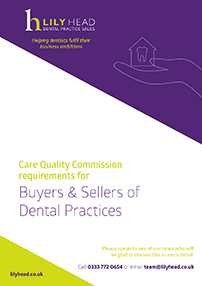Who doesn’t love a free trial or a free sample of something? It is a well understood sales technique and can range from being given something as simple as a free key ring to a holiday. Marketeers consider it a great way to build trust in a product or service.
I experienced it myself recently. I was invited by some friends of to join them at the Ribeye Boats Winter event in Dartmouth, Devon. Ribeye builds bespoke leisure boats and my friends were interested in buying one.
We were welcomed with bacon sandwiches and coffee. We had an accompanied tour of the factories and learned about the different boats and the specifications their new owners had requested. Then we boarded one of their demo boats in Dartmouth and left the safety of the river Dart for some high intensity sea trials.
It was a great experience and it really helped my friends with their decision making. So, an all-round positive experience.
Can this kind of strategy work when selling your dental practice? There is no doubt it can in the right circumstances. But there are also significant risks to consider.
I have met dentists who have tried this approach in one of three ways.
- The Principal has identified an Associate Dentist within their business who specifically expressed ambitions to buy their practice at to some point in the future.
- An Associate approaches a Principal suggesting they would like to buy the practice if they can work in the practice for a period.
- The Principal has agreed to hire an Associate during the due diligence process, but prior to completion.
It can seem like a great opportunity for the Principal to get to know the prospective purchaser and vice versa. It enables the Associate to start developing a relationship with the patients. It means the Principal may be able to leave immediately a deal completes, or within a shorter time period than might otherwise be expected. The vision is that the sale process will be a pleasant transition with a trusted colleague. It could be that you could also avoid paying a brokers commission as the Principal manages the sale themselves.
I have to be transparent here. Deals which complete I hear much less about. I typically speak to Principals where none of these strategies has got the outcome the Principal expected or wanted. Invariably our clients need our help getting their exit pan back on track.
I often write about the fact you should share your practice with as many interested parties as possible and not just a sub set or in examples 1 & 2 above only one person. Typical subsets might be corporate buyers, priority buyers or someone’s little black book of buyers. For the best results there must be a competitive bidding process around the sale of your practice with multiple interested parties. It is always the market which determines the value of a dental practice. It is not the valuation. That is simply a guide. By limiting the practice to one potential buyer armed only with a valuation Principals are eliminating those ‘competitive market forces’ from a deal.
If your prospective buyer came to you through a broker then you can be confident they have carried out their own due diligence to ensure they have the funds in place to complete on a deal. Your broker will also coach the buyer through the acquisition process. If the prospective buyer is ‘in house’ then you will have to do your own due diligence to reassure yourself they can pay what you expect.
The sale of any business is likely to involve some intense negotiations. It is not personal it is business. If the buyer and seller work together as part of a team within a practice then those negotiations can impact their relationship as colleagues in the same business.
I have had clients where their purchaser is an employee find their sale has been delayed, sometimes by years because that purchaser’s life circumstances have changed. I have clients whose sale was delayed in order to put more pressure on them to concede on things simply to get a deal done because they are getting older. I have seen examples of purchasers assuming the role of owner before they have completed on a deal which leads to confusion and mixed messages within the practice.
We act for Principals who are selling to an Associate(s) who works in their business. We can bring in more interested parties if the Principal wants. Otherwise we complete the due diligence on the funding, negotiate on behalf of the Principal and keep the deal moving to completion.
With deals we have brokered I always advise my clients not to employ the dentist who has agreed to buy their practice, but to wait until completion before letting them in.
If any of this resonates with you and you would like to discuss your scenario with me then I would be pleased to advise you.
This article was written by Abi Greenhough, the Managing Director of Lily Head Dental Practice Sales . It was first published in the April 2023 edition of The Dentist Magazine.
If you would like to talk about anything to do with buying, selling or financing a dental practice anywhere in the UK then Contact Us today.






